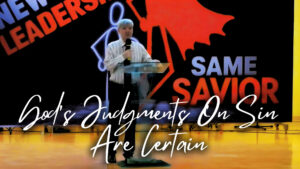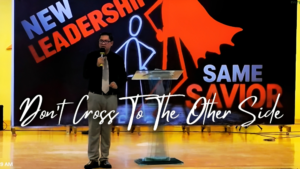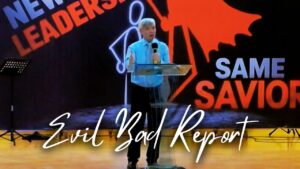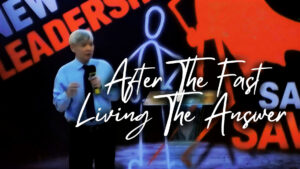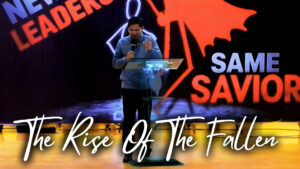THE DIVINE METRONOME
Genesis 2: 1- 15
1Thus the heavens and the earth were completed, and all their hosts. 2 By the seventh day God completed His work which He had done, and He rested on the seventh day from all His work which He had done. 3 Then God blessed the seventh day and sanctified it, because in it He rested from all His work which God had created and made.
4 This is the account of the heavens and the earth when they were created, in the day that the Lord God made earth and heaven. 5 Now no shrub of the field was yet in the earth, and no plant of the field had yet sprouted, for the Lord God had not sent rain upon the earth, and there was no man to cultivate the ground. 6 But a mist used to rise from the earth and water the whole surface of the ground. 7 Then the Lord God formed man of dust from the ground, and breathed into his nostrils the breath of life; and man became a living being. 8 The Lord God planted a garden toward the east, in Eden; and there He placed the man whom He had formed. 9 Out of the ground the Lord God caused to grow every tree that is pleasing to the sight and good for food; the tree of life also in the midst of the garden, and the tree of the knowledge of good and evil.
10 Now a river flowed out of Eden to water the garden; and from there it divided and became four rivers. 11 The name of the first is Pishon; it flows around the whole land of Havilah, where there is gold. 12 The gold of that land is good; the bdellium and the onyx stone are there. 13 The name of the second river is Gihon; it flows around the whole land of Cush. 14 The name of the third river is Tigris; it flows east of Assyria. And the fourth river is the Euphrates.
15 Then the Lord God took the man and put him into the garden of Eden to cultivate it and keep it.
Orchestration means,the planning or coordination of the elements of a situation to produce a desired effect; the act, process, or art of arranging music for an orchestra.
“Orchestra” is a musical ensemble of mixed instruments based on strings and winds, under the direction of a conductor, employing 4 classes of instruments: strings, woodwinds, brass and percussion.
Life is like an orchestra guided by the composer and conductor of the universe.
The Conductor serves as the metronome.
Title: THE DIVINE METRONOME
- Metronome in the Garden of Eden.
- The Missing Synchrony.
- The Need to Reset.
- The Divine For Our Metronome.
METRONOME – is an instrument that produces a regular repeated sound like a clock, to help musicians play music at a particular speed.(picture or video of a metronome)
When you are new to it, a metronome can be so rigid and distracting or hard to follow. But when you allow it to rule or guide you, it will make you a disciplined musician.
- METRONOME IN THE GARDEN OF EDEN
The Garden of Eden was a perfect creation. God did not create everything at one time. He knows what should come first and what should be last. And when everything was done, it was a wonderful creation.
The garden was paradise on earth. It is where the presence of God came in the cool of the day that brought peace and serenity. There, the emotions were high and relationship was intimate.
God’s Symphony – the harmonious arrangement.
At the very command of the Master Conductor what was without form and void became the heavens and the earth and everything that is in them. Every creation did not fail to function, and they moved according to God’s metronome.
II. THE MISSING SYNCHRONY
Synchrony – the way in which two or more things happen, develop, move, at the same time or speed.
Rest and order were destroyed by the fall of man. God’s metronome was neglected, and the human metronome took over.
Different metronomes:
- Desires
- Money
E.g. Song “Money, Money, Money” by ABBA
The idea that money plays a significant role in many aspects of our lives is a complex issue with deep roots in history, economics, and social structures.
Few reasons why money seems to have such a pervasive influence:
- Economic Systems: Money often correlates with access to resources, opportunities, and a higher standard of living.
- Social Hierarchies: Wealth has been associated with power, influence, and status.
- Basic Needs: Money is essential for meeting basic needs such as food, shelter, healthcare, and education.
- Consumer Culture: Advertisements and societal norms often equate material possessions with success and happiness.
- Policy and Governance: Government policies, taxation systems, and regulations can also influence the distribution of wealth within a society.
While money does play a crucial role in many aspects of our lives, it’s important to remember that it doesn’t define a person’s worth or value.
- Fame
Fame is deeply attractive because it seems to offer very significant benefits.
The fantasies:
- When you are famous, wherever you go, your good reputation will precede you.
- When you are famous, you will be safe from rejection.
- No one will be able to afford to upset you.
- You’ll be boss.
The desire for fame has its roots in the experience of neglect. No one would want to be famous who had not also, somewhere in the past, been made to feel extremely insignificant. We sense the need for a great deal of admiring attention when we have been painfully exposed to earlier deprivation.
- Expectations.
The dictionary defines expectations as a “strong belief that something will happen or be the case in the future.” Expectations are further complicated by cultural norms, past experiences, other people, our mindset, and even fear of others’ opinions.
The more we get to know someone and the deeper our relationship gets, the more we expect of that person. The more we achieve or the closer we get to someone, the more our goalposts move. We may feel like we need to have our expectations exceeded to feel happy. What’s left is empty achievement and struggling relationships.
- Indiscipline
Our Indiscipline may lead us to:
- Forgetfulness
E.g. Consequence of forgetfulness: An old Man’s story.
We forget because we’ve made other things more of a priority. Preoccupied with lesser things, there is little time spent thinking of bigger ways and plans.
Forgetting God is not merely an issue of spiritual amnesia. It can also be the result of idolatry, where we believe and act as if we need someone or something more than we need Him. Paul spoke of—trading “the truth about God for a lie” and worshiping “the things God created instead of the Creator Himself” (Romans 1:25).
Worshiping the creature over the Creator is not the way we were designed to spend our days. If left unchecked, it will break our fellowship with the only true Source of life.
Paul reminds us that it’s in the Creator God that “we live and move and exist” (Acts 17:28). Choosing lesser gods will keep us from the only true One. Choosing the lesser will keep us from the greater.
- Impatience– Running Ahead
When we rush ahead of God, we miss His perfect plan.
Two Old Testament examples:
- Abram and Sarai.
In Scripture, God made a covenant, an unbreakable promise with Abram.
- In Genesis 12, God promised to make him “a great nation” (vs. 2) and give the land to his offspring (vs. 7).
- In Genesis 13, God told him that his descendants would be like “the dust of the earth,” meaning that no one could count them (vs. 16).
- In Genesis 15, God declared that his children would be as numerous as the stars in the sky (vs. 5).
There was only one problem. Abram and his wife Sarai were old and childless.
God told Abram and Sarai they would have a son named Isaac (Genesis 17:19-21).
God’s promise came to pass, though not on their timetable.
Although God always keeps His word, we often grow impatient. We think our timing is better—only to complicate our circumstances.
- King Saul.
As Israel’s king, Saul enjoyed many privileges and responsibilities. But offering burnt sacrifices was NOT one of them.
During the second year of his reign, the Philistines gathered to attack In response, the men of Israel fled and hid themselves.
The prophet Samuel said he will come and be the one to sacrifice to the Lord and intercede on their behalf.
Too impatient to wait any longer, Saul offered the sacrifice himself.
The Bible says that “as soon as he had finished offering the burnt offering,” Samuel arrived (I Sam. 13:10). Saul armed himself with excuses, but the bottom line was that he ran ahead of God. As a result, Samuel declared that God would not establish Saul’s kingdom (I Sam. 13:14).
Losing our place in a musical piece might leave us embarrassed, but getting out of sync with God’s plan can only bring regret.
III. THE NEED TO RESET
10 Commandments in order in simple terms:
- You shall have no other gods before Me.
- You shall not make idols.
- You shall not take the name of the LORD your God in vain.
- Remember the Sabbath day, to keep it holy.
- Honor your father and your mother.
- You shall not murder.
- You shall not commit adultery.
- You shall not steal.
- You shall not bear false witness against your neighbor.
- You shall not covet.
The law was written by God’s finger on tablets of stone to reset the metronome.
If there was order or sequence in the account of creation, there is also an order in the 10 Commandments.
- Everything starts with God who should be the focus of life (1st – 3rd Commandment).
- When we have started life with God, we will be able to have rest (Sabbath – 4th Commandment).
- And only when we have found rest in God, we shall find peace and order with the rest (5th – 10th Commandment).
God sealed (stamped) His creation with REST on the 7th day. And when He gave the law, placing “Sabbath” at the center, the metronome was reset.
Sabbath at the center signifies that God brings rest and rest brings our peace. Resting in God resets the metronome – the timing of our lives.
Application: When we get our lives right with God and make His presence (Sabbath) seal it, we will have true peace. Resting in His presence brings back the metronome. When we start the day in His presence, when we start the week, when we start the year in His presence, we are bringing back the metronome into our lives.God’s timing is always perfect. Our timing always fails but we often use our own timing instead of resting in God’s time to find rest, peace and purpose.
We would never tell a metronome that its timing is wrong and ours is right. Even though we may think our timing makes sense, the truth is we can’t see or understand God’s schedule.
The book of Isaiah speaks to this very truth:
For my thoughts are not your thoughts, neither are your ways my ways, declares the Lord. For as the heavens are higher than the earth, so are my ways higher than your ways and my thoughts than your thoughts (Isaiah 55:8-9).
IV.THE DIVINE FOR OUR METRONOME
When the metronome is not followed seriously, there will be no harmony. Because we have failed to follow God’s order, there is no rest and peace. Then we start to just live according to how we want to live, listening to and following different metronomes.
Our mind tells us that maybe wealth and fame may bring peace. Coping up with the demands and expectations of others may make things right. Or maybe we think that by being more disciplined and patient we can have rest.
But we know in our hearts that there is no guarantee for our fallen nature to bring forth good fruit. A corrupt tree will only bear corrupt fruit. There is no peace to the wicked. Only the righteous man’s steps are order by God and yet there is no righteous, no, not one. So God made Him to be sin for us who knew no sin that we might be made the righteousness of God.
In order for us to find peace, we need to find rest. Therefore, we must find our Sabbath and our Sabbath is resting in God’s timing. It is the Divine metronome that you and I cannot afford to stray from.
How is this Sabbath or resting in God possible?
Jesus said the Son of Man is Lord of the Sabbath. Jesus is the Lord of the Sabbath. He is the fulfilment of the Sabbath. He restored the ‘Rest of Sabbath’ and therefore in Him ‘you will find rest for your soul.’
How does He give rest to the soul?
Jesus experienced physical exhaustion on the road to Calvary and emotional pain when He was left alone dying on the cross. And above all the sorrow of knowing that the Father who initiated Rest in the beginning has turned His back on Him, denying Him rest. For what? For our restlessness. The punishment that brought us peace was upon Him. And because rest was taken from Him until His death on the cross, strength and power were given to Him on His resurrection.
Today, we don’t have to live in restlessness because the Son of God took them all on the cross. Today we can live in real peace because He overcame even the worst fear – death, when He rose from the dead.
CONCLUSION:
It is God’s desire for His people to live at rest and in real peace and it can only happen when we live and move according to His metronome. We have the Divine Metronome in His own Son because His death brought rest and peace to our soul. To the degree of how we live and move in His Divine metronome, to that degree we will experience rest and real peace.
